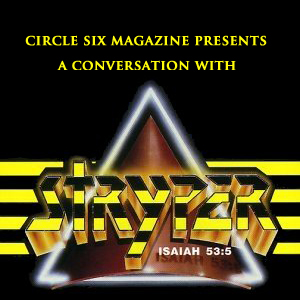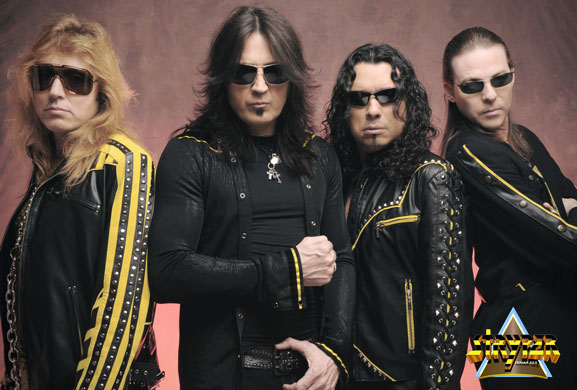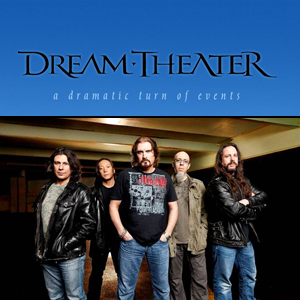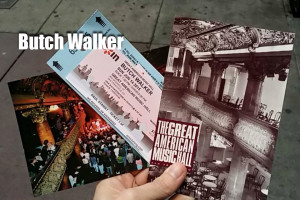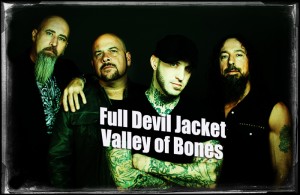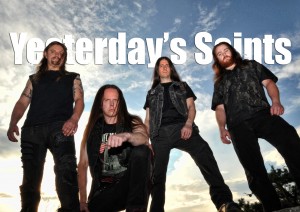Still Can’t Stop The Rock: A Conversation with Stryper
20 min read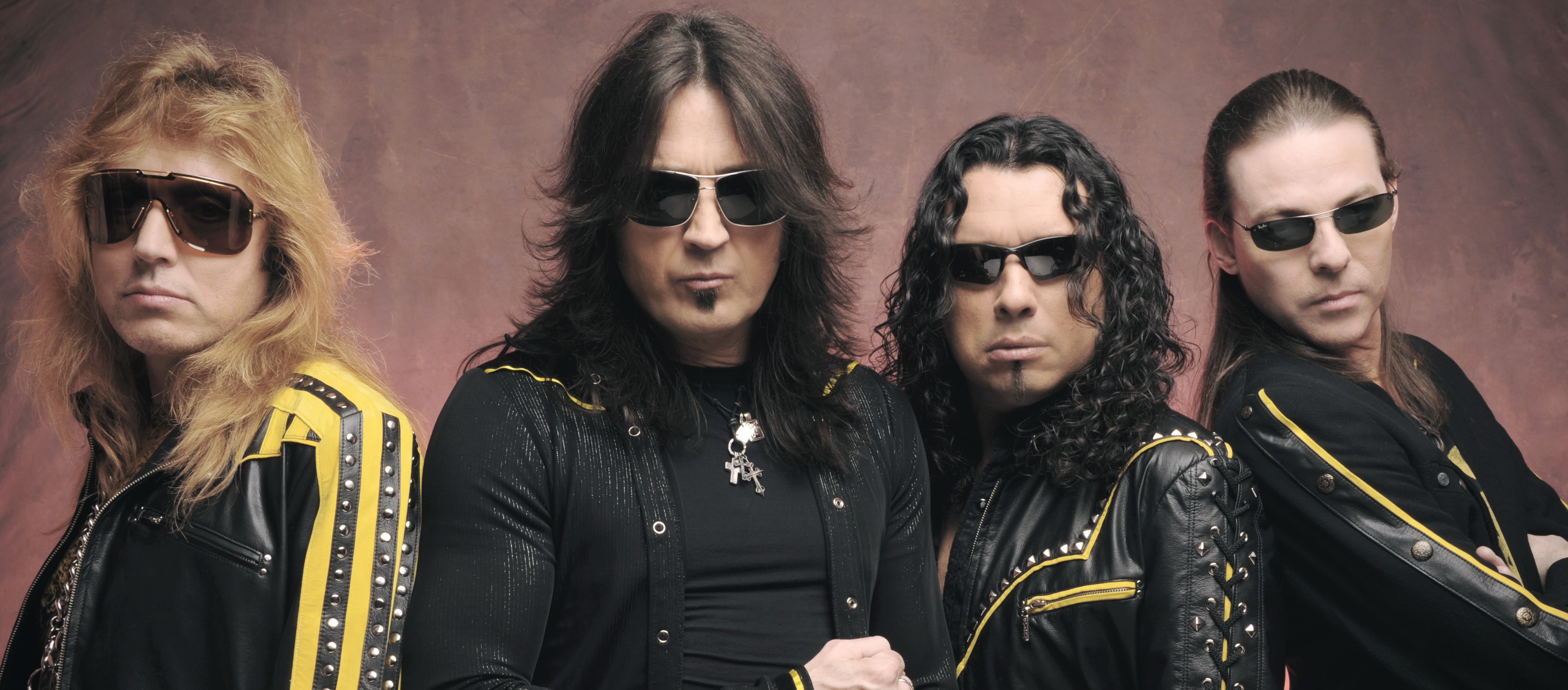
It’s hard to think back on certain eras of music without thinking about how those eras were branded. The sixties brought us free love, the seventies groovy acid rock and progressive rock, and the 80’s sort of combined the sixties and seventies and took its love affair with sex, drugs and rock and roll to new heights and gave it all to us in excess. In some ways the 80’s were so self indulgent that the negative stigmas and calamity born out of that time, especially when we remember bands that made headlines, were worn proudly like badges. The music you identified with most was your symbol. If you were a metal head, the Devil, wasn’t just a major character in the scene, but was a unifying symbol for rebellion and your disdain for the mainstream. For metal fans the devil was their a badge of courage and their unifying force. So while darkness proved to be a dominant theme in that genre – Stryper proved to be the one band that survived the calamity of that era by continuing to embrace something that they always believed was just a little bit stronger than the evil that some groups claimed to embrace: God.
I recently got an opportunity to chat with Michael Sweet of Stryper and find out how he felt about some of the negativity the band faced for not embracing the darkness as well as what they are doing now. So sit back and check out the conversation. It just might surprise you how normal some Christians can be.
C6M: I wanted to talk a little bit about the history of the band. I mean it’s a pretty long and extensive history, and a couple of my questions revolve around kind of what it was like during the early days of doing the little clubs on the Sunset Strip, but also I wanted to combine that with the fact that you guys were also kind of doing churches as well. So, talk a little bit about that and sort of the differences between the two, I guess, realms of playing.
Michael Sweet: Well, I mean we kind of — because we were an LA street scene band, you know, we grew up on Sunset and Santa Monica playing all the clubs, Troubadour, Gazzari’s, Whiskey, and that’s — those were our roots, and then we decided to take a different path and commit our music and our band to God and — but yet at the same time, in doing so, we didn’t want to be classified or labeled a Christian band, although we consisted of Christians and we’re made up of Christian guys, we didn’t want that tag. We always — our vision was to always reach out to the people that didn’t go to church, you know, that weren’t interested in going to church. So, that was our whole thing, and it still is really, but because we were made up of Christians and we got a lot of press because of that and a lot of controversy and buzz-worthy notes, you know, we kind of got — that label got pinned upon us, and therefore we were contacted by a lot of churches to perform. And we performed at a select few, but we always try to make it our goal to not do that. It was never really our thing as a band, as Stryper to go and play churches. It was more our thing to go play festivals and clubs and whatnot and reach out to those people that don’t go to church. So, you know, it’s kind of — it’s a double-edged sword, I guess, so to speak. We get offers and requests from people of all walks of life, churches, mainstream. I mean it’s kind of interesting sometimes, but we do have to kind of keep a limit on how many churches we’ll do, we try to.
C6M: Sure. Obviously you alluded to some of the misconceptions about who you guys were. I mean did that sort of — like you were saying, a double-edged sword thing. Did that sort of play into how like some people would want to play with you or not play with you just based upon the idea that you guys were four Christian guys in a band playing music? I mean did they have this idea that like possibly if they played with you, you guys might like turn water into wine on stage and float and do all kinds of weird stuff?
Michael Sweet: Yeah, I think so. I think unfortunately people’s perceptions of us, not all the time, but a good portion of the time, are just so ridiculous. And that’s from all sides. You know, from the Christian side, the church side, they think that we’re radicals and we may not really truly be Christians, and we’ve heard the term wolves in sheep’s clothing and all this kind of stuff. And then from the mainstream side, we get the fear of “Oh, my god, yeah, they’re Christians. No, we can’t play with them. We can’t tour with them,” and it really limits us a lot of times when we’re trying to get on a package tour or whatnot. And we’ve heard those comments from management and from labels of “Oh, no, no, no, it’s the Christian guys. No, we can’t do that,” and it’s like, “Well, why not?”
C6M: Right.
Michael Sweet: “Have you seen us? Have you gone to a Stryper’s show and seen that we’re just a rock band, you know, that goes up and delivers and puts on a show and entertains people and rocks it?” And I think it’s a huge misconception, because we just played Monsters of Rock Cruise, Cinderella, Tesla, a number of other bands, Night Ranger, and just all these bands. And because we were stuck on a ship, it was kind of cool, because all the bands had the opportunity to see the other bands for the first time in their lives. And we had a lot of people coming out to see us, and that was the talk. The people came up to us, the guys in Tesla, the guys in Cinderella, they’d come up to us and say, “Man, we had no idea. You guys really killed it. It was amazing.” You know, and it’s like I wanted to say, “Well, what did you think it was going to be? Did you think we were going to be like preaching and having church?” And I think that’s what people think a lot of times.
C6M: Yeah, yeah, definitely. I mean I remember back in I guess the late 80s, yeah, it did seem like the funny part would be that you couldn’t win for losing sometimes. You know that you had this perception of being sort of the clean pretty boys of rock and then you’d have Jimmy Swaggart attacking you for being completely of the devil.
Michael Sweet: Yeah.
C6M: And yeah, it just seemed like wow, you know, how do you break out of that mold? I guess getting into that, I mean, one of the things that I thought was really fascinating, just speaking about that whole, I guess, dichotomy of who you guys were, was the fact that you guys sold better in the secular market than you actually did in the Christian market. I don’t know if you knew that but…
Michael Sweet: No, no. Yeah, we’ve done all the stats and it’s true, we’ve sold — most of our sales were mainstream, two-thirds roughly give or take were mainstream, the rest were Christian market based. And nowadays most of the sales, although they’ve depleted all around the board for all bands, but ours have as well obviously, and we’re mostly mainstream as far as our sales go. And it is really weird. It’s very strange to be getting it from both sides, but we try not to cry about that or moan and complain. I mean that’s just the way it works, that’s the way it is, that’s the way this world is. I think they fear anything that’s Christian based, a lot of times you’re going to be a target board for the darts. I mean people are going to throw the darts, man, and it’s just the way it is, regardless if it’s music or cinema or — it doesn’t matter what it is. You make a stand for God, man, look out. You better put on the armor, because people are going to attack you man, and that’s just the way it is.
C6M: That’s interesting though. I mean because like you were saying, you get it from both sides, but then there are people that kind of come out and they’re not afraid to say that they’re fans of the music, that they’re fans of what you guys were doing. And an example of that, I mean there’s a couple that I wanted to throw out there. I mean one of them is — Eddie Trunk is a big advocate of you guys. He definitely goes to bat for you guys all the time.
Michael Sweet: Eddie Trunk — and he is. He really is, and then even more so Jim Florentine is a huge fan. You know, he actually came to see us play back in the day and he’s told his story. And not to interrupt you, but yeah, there’s guys like you know, Dan, Larry the Cable Guy, and not that he’s the most controversial character out there, but certainly wouldn’t expect him to be a Stryper fan. And there’s guys like Chris Jericho and there’s guys like on the other side of the map musically speaking. Twiggy, I found out that in the past few years that Twiggy was a big fan. He came to see us play in LA and he got a picture of himself dressed up as a Stryper member in high school. John 5, guitar player for Zombie, he still has a Stryper bible he got at a Stryper show. The drummer for Disturbed, he came to our Chicago show and was singing the words to every Stryper song, grew up on Stryper. So, there’s a lot of bands and “dark bands,” a lot of band members and these bands that are supposed to be evil and as hardcore as it gets, blah, blah, blah, and then you find out they’re Stryper fans. And it’s kind of cool. I mean it’s humbling. It’s really great to hear that and see that, but I don’t know what the fear is to admit. I think sometimes there’s a fear in admitting that you’re a Stryper fan.
C6M: Well, again it’s funny. I noticed that Rob Halford even had some very nice things to say, and you guys did a cover album and you cover a Judas Priest song Breaking the Law. I had a chance to talk to Rob myself and he is a very genuine, very nice guy and very — I guess that’s what I’m coming down to in the statement here is that a lot of the guys can appreciate good music when it’s good music, because he had nothing but nice things to say when he was just referring to your cover. So, has anyone else mentioned how they were honored by you guys doing an album of cover tunes?
Michael Sweet: Well, yeah. I mean we’ve got a ton of positive comments from everybody, and that’s not why we did it, but we did it just because we wanted to have fun and do something different and show people that, you know, it’s not about putting rules and regulations on Christianity. It’s not about saying you can do this and you can’t do that. I get really sick and tired of that stuff, and I just think it’s baloney and we wanted to kind of show people that and break down some barriers and some walls by making that record. But you know, people like Rob Halford, who I’ve heard that he has a deep faith in God, and there are so many people out there in this business that do. They have a deep faith in God and they believe in God and they pray to God, and you know, in their private lives they go to church, but yet they’re in these dark bands and it’s interesting. It is really interesting, and it’s almost like they have one side of themselves they want to show or people to see, and then they have another side. And I’m not saying that’s a bad thing. I’m just saying we’ve chosen to not let there be boundaries in who we are or lines or separation. We’ve chosen to, from since 1983, to make a bold stand and say, “This is who we are. You either accept it or reject it, but it’s who we are and we’ll go to our graves being remembered for taking a stand, a bold stand for who we are.”
C6M: And that is an interesting statement that you make, because I’ve had a chance to talk to so many people in the industry, and I’ll bring up the issue. For instance I got to talk to Zakk Wylde — and Rob Halford’s another one, and a few others, where you know, I talk about like the themes of their music. I got to talk to Dave Lombardo of Slayer, and you know, they sort of like chuckle a little bit and say, “Well, you know, it’s more like we’re creating a horror novel or something like that and trying to recreate that on stage.” Where Stryper sort of — you were sort of singing about your lives in a way that was a little more sincere. I find it interesting years later looking back, because those were all the bands that were like scary and you’re really like “Oh my goodness,” you know, and it’s like years later they’re like “Oh, well yeah, it’s just an act you know, just having fun or whatever.”
Michael Sweet: And why is it — well, here’s the funny thing — and two points. First point being why is it okay for “satanic bands” or at least satanic bands is regarding the imagery, and it’s a show as they say. Why is it okay and cool and accepted for that to be okay, but yet, a Christian band putting on a show for God, they’re doing it for the devil, we’re doing it for God, but yet we’re put under the microscope and it’s not okay, because it doesn’t go with Heavy Metal. And it’s like I always find that very interesting and really pretty — pretty silly, because the way I view things is God is the creator of all things, and these people that live for the devil or support the devil or speak for the devil, they’re so quick to say that there is no God and Satan rules, but yet at the same time they believe in the devil but they don’t believe in God, and I find it very — I find it contradictory. I think it’s pretty silly. I mean if you believe in the devil, you got to believe in God, you got to believe that there’s a God, like there wouldn’t be a devil without a God in my opinion. You know, that being said, I think God’s the creator of all things. He created the devil, you know, Lucifer as an angel, and it’s like I just believe that you know we have every right just as they do to portray our faith and our beliefs and put on our show, as they say, as much as they do, as much as the next guy.
C6M: Sure. So, getting back to your music, you guys were sort of trailblazers in a lot of ways. I mean because in a way you guys crossed over — well not really crossed over. Like you were saying, you kind of decided that you were going to basically have your band be your band and your message be your message. But in a lot of ways, it did sort of create a path for other bands to follow. And I don’t know if anybody has ever come to you 20 years later and said anything, but I mean I sort of feel like there wouldn’t be an Evanescence or a Devil Wears Prada or an Anberlin sort of without a Stryper. Even though the music’s different, you know, there’s scripture in their lyrics. They mention Christ and things like that, and it’s just something that I think for whatever reasons you guys got the baseball bat for it, and it’s almost a little more accepted, because you sort of trail blazed for them. I mean has anyone ever come to you and sort of thanked you for at least making it a little easier?
Michael Sweet: A few people. I mean a few bands have, but not many and that’s okay. I mean we just happened to be in the right place at the right time, and back in ‘83, ‘84 and we were able to fortunately be a part of that movement, if you want to call it that, and kind of as you put it, trailblazing and leading the way, and to look at it that way is pretty cool, pretty amazing. It also makes me feel really old, you know. But man, yeah, it’s awesome. It’s awesome to have been a part of leading the way and then to see all the bands follow suit afterwards, obviously just a few years after us, and then now, you know, 30 years after us. It’s pretty crazy. It’s very cool though, exciting to see, man. I just listened to this band called Blessed by a Broken Heart. I don’t know if you’re familiar with them much, but just checking out some of their YouTube videos and it’s really wild, because it’s like the vocals aren’t exactly like Stryper vocals. They are similar in the harmonies and whatnot, but the guitar parts — and there’s so many flavors that I hear that are similar to the old Stryper tones and records, and it’s really cool to see things come around full circle. That’s the ultimate compliment. It’s very cool.
C6M: Yeah, I noticed that and I mean not just for Stryper. I noticed that everything has its cycle. I was listening to Avenged Sevenfold and thinking the same thing with the dual guitars and that kind of stuff. I’m thinking to myself “Wow, that’s Iron Maiden, that’s Stryper, that’s all of that coming back again,” you know.
Michael Sweet: Exactly and for the longest period of time that wasn’t popular, and so much so that it affected us when we made the record Reborn. It came out in 2005. We didn’t do any solos on it. We purposely tried to stay away from doing solos, and especially harmony solos. And I’m thinking this is crazy. After the fact I thought this is crazy, because that’s who we are. You never shy away from who you are. That’s the ultimate mistake, biggest mistake.
C6M: Sure. So, now that you’re back and you’ve been around playing again, getting back into the groove of the new music scene, I mean a lot has sort of changed. You mentioned a little bit about how the sales have gone down. I mean we’re in a new age of music. We’re in the new age of digital download and you know, it started out with the Napster thing, but now iTunes owns everything and things like that. So, how do you feel about how things have changed, because it’s totally different you know?
Michael Sweet: It is. I mean speaking of — it’s funny that you say that, because I’m doing live performances now in this site called Stageit. I don’t know if you’ve heard of it. It’s called Stageit.com and bands from Bonnie Raitt to just — you can go in there, and there are just tons of people in there, rock, soul, R&B, country, whatever. And they’re going in and they perform in their living room or in their studio and people purchase tickets and they watch them on their computers, and that’s technology. You know it’s crazy. It’s really — we’re going down a different path here because of technology and it’s definitely different, but it’s definitely very cool. And I think the more we accept it and go along with it, the better off we’re all going to be regarding musicians and bands, because it’s a new day. It’s not about selling records anymore. The days of selling for bands like Stryper of selling a million copies of a record, those days are gone. They’re long gone. It’s all about downloads and even the downloads by comparison are a lot lower in numbers. It’s more about going out and performing and finding new and unique, interesting ways to stay afloat and to survive. And you got to follow technology’s lead on that, man.
C6M: Sure, sure. It shows you how — it’s weird, but you know, the whole social media revolution, I mean that whole Stageit thing is a part of it, because the fans sort of demand like instant access to everything. I mean sometimes the news of bands breaking up, you know, hits the social media before the band even knows that they’ve broken up.
Michael Sweet: I know. It’s crazy.
C6M: It is crazy.
Michael Sweet: Because anybody can go in on their computer and make it live, you know, and then it’s all over the internet, exactly. So, you can say whatever you want to say even if it’s not true. It’s crazy.
C6M: True, true. So, let’s close by talking about what’s going on now and what’s going on in the near future, what do you have coming up in terms of albums and also touring?
Michael Sweet: I got a lot of stuff going on. I just finished a solo record and that’s really a big deal for me right now and obviously a big push. I’m excited about it. I got Kenny Aronoff drumming on it. I got a few guest players. I got Kevin Max from dc Talk singing on a song with me. I’ve got Doug Aldrich, the guitar player for Whitesnake, playing on a song.
C6M: Awesome.
Michael Sweet: And you know we’re talking to a few other guests about possibly being on the record, but it’s really — it’s a very eclectic, diverse record, consisting of real edgy songs and then going to the extreme and opposite side of real — there’s a song that’s almost the Southern Rock vibe. So, it’s real different for me, but I think in a good way and it all makes sense. It feels good. It’s a really great sounding record. I’m excited about that and I’m working on a book that’s going to be released roughly around the same time the record is released, so sometime this year.
C6M: And what is the book about?
Michael Sweet: It’s just an autobiography about my life — the good and the bad, the ups and the downs and how I got into the music business, the family I come from, joining my brother’s band, the success of Stryper, walking away from Stryper and the low and high points of that, my wife passing from cancer, Kyle remarrying, joining Boston, I mean just all the kind of whirlwind details of my life, and it’s really turning out great. I’m excited about it and it’s going to be a little different from a lot of books you read. It’s just an open, honest book, no pun intended, and most likely will be called Honestly.
C6M: Oh, nice.
Michael Sweet: So, that’s coming out this year. And then working on a rerecord Stryper record, which to most people might not be anything new, but the reason why we’re doing that is we signed a publishing deal and we want to make it easy for them to go after film and TV, and we kind of wanted the challenge of rerecording a lot of those old songs. So, we recorded 14 old classics and two brand new songs.
C6M: Oh, very cool.
Michael Sweet: And that’ll come out this year as well, probably the latter part of the year, and then we’re going to start on a brand new all-original Stryper record probably around January of ‘13.
C6M: Oh, very, very cool. That’s very…
Michael Sweet: So, we got a lot going on. We’re touring. We got a bunch of Stryper dates on the books right now, so far about 24 dates, planning on maybe 10 to 15 more, and then I’m planning on a solo tour. That’s going to be a surprise. I’m talking to a band right now about opening and them being my band for the solo tour, and it’s I think going to be a shocker for a lot of people.
C6M: Very cool, look forward to the surprises.
Michael Sweet: Yeah, people will be like, “What the heck?”
[Laughter]
C6M: Yeah, but isn’t that — that’s the summation of your career, right?
Michael Sweet: Yeah, pretty much.
C6M: So, that’s very, very cool. Hey, thanks so much for taking the time out of your day. I know you’re busy, but I really appreciate to be able to talk.
Michael Sweet: All right, brother. Take care. Great talking to you and be safe, okay?
C6M: You too, all right. Talk to you later. Bye.
Michael Sweet: Take care. Bye-bye.
As I reflected on our conversation, I am reminded of my younger years when I would not just buy every new album that was released, but I would buy it and then absorb it – absorb it all. I stumbled upon Stryper at The Wherehouse, picking up the In God We Trust album and just being blown away by the production value alone. It was a very big contrast to what was out there, but I was starving for something different and they really filled that void. I immediately purchased To Hell with the Devil and everything that came before it. Maybe I was just tired of the same old thing. In reflecting upon it, I can’t say much has changed except that record stores are now a thing of the past much like my youth. Despite this, Stryper still makes it on my yearly play list. It just reminds me of the days when I was desperate for something else in life and I just need something else to fill that void. Sometimes that means I need to inject a little God into my ears because the truth is that the devil is still big business. Even all these years later, I still think about Stryper in this context of God versus the devil as they continue to rock for values that sometimes bring them more ridicule than praise. It’s admirable and makes me appreciate speaking to Michael Sweet as Stryper continues to don the yellow and black attack for another opportunity to rock a new audience. You have to admire them because at least they are still rocking it their way.
If you get a chance, check out their new albums such as The Covering and catch one of their upcoming shows as they tour America this summer. And if you get a chance to chat with any of them members, let them know that Paul sent ya.
by Paul Stamat
